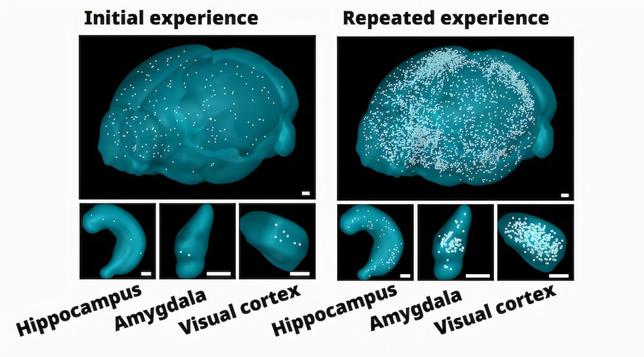2025-11-12 03:14:44
2025-11-12 03:14:44
2025-10-13 10:40:00
A PCA-based Data Prediction Method
Peteris Daugulis, Vija Vagale, Emiliano Mancini, Filippo Castiglione
https://arxiv.org/abs/2510.09246 https://arxiv.org/…
2025-11-08 23:33:45
Please sign this petition
I'm a chemist. As a grad student I was a TA and a tutor. I taught college chemistry classes.
That's teaching a subject, not communicating about a technical issue (yes, these really are different skills)
And climate change advocacy has highlighted how difficult communicating is.
I wish this proposal had been enacted when I was a student.
Please sign.
2025-10-13 08:26:50
Exploring Teachers' Perceptions of ChatGPT Through Prompt Engineering
Dimitrios Gousopoulos
https://arxiv.org/abs/2510.08634 https://arxiv.org/pdf/2510…
2026-01-10 08:24:07
CueLess
The Animal Behaviour Podcast. With a cumulative 60 years of professional animal training experience, Deane, Ryan and Steve can't help but get nerdy on the science of learning when they get together...
Great Australian Pods Podcast Directory: https://www.greataustralianpods.com/cueles
2026-01-08 05:53:18
2025-11-10 17:26:43
🌟 Astrocytes are superstars in the game of long-term memory
#memory
2025-12-02 21:00:22
Organic geochemical evidence for life in Archean rocks identified by pyrolysis–GC–MS and supervised machine learning: #life in ancient rocks: https://gizmodo.com/ai-uncovers-evidence-of-life-in-3-3-billion-year-old-rocks-2000687539 / https://www.reuters.com/science/new-method-spots-signs-earths-primordial-life-ancient-rocks-2025-11-18/ - a machine-learning-enhanced approach to chemical analysis is drastically expanding the chemical record of life on Earth, and it could help us find evidence of life on other planets too.
2025-12-03 14:20:29
I think the root of the “AI” evil is when AI researchers in the 1960s recognized that they outrageously underestimated the complexity of the human mind.
They became humiliated by their promises that AGI was just a few years away—and then went full goblin mode that’s lasting to this day.
Some of the OG researchers took it quite badly that they stalled and weren’t in the limelight anymore.
‣ Marvin Minsky (co-founder of MIT AI lab and arguably the most important early AI bro) went on to visit Epstein’s island multiple times.
‣ Karl Steinbuch, who came up with the German term for computer science ("Informatik")—who also was a literal Nazi (and likely war criminal) in World War II—later wrote articles in ultra-right magazines about things like “equal rights rob women of their children”.
‣ John McCarthy (inventor of Lisp, co-authored document that coined the term “Artificial Intelligence”) was a staunch Republican who years later claimed (in a serious article) that “thermostats have beliefs”.
[one moment, I am receiving more information]
‣ There’s a second Epstein Island AI pioneer? Who also was Chief Learning Officer at… Trump University? That would be Roger Schank (founded one of the first AI companies in the 1980s AI boom, it even had an IPO. Of course the 1980s AI bubble burst).
Obviously all of the above received all the awards in computer science and are very revered people.
2025-11-28 15:30:25
I've only just learned of the death of our former colleague Chris Gathercole last April. I knew him as an advocate for learning disabled people, taking their place, with support, in the life of the community. He had a profound influence on provision in the North West, where with Tom Mclean, who died the previous year, and others, he steered into being a radical policy framework that shaped the pattern of de-institutionalisation in the region.
2025-10-15 10:08:41
Autonomous Legged Mobile Manipulation for Lunar Surface Operations via Constrained Reinforcement Learning
Alvaro Belmonte-Baeza, Miguel Cazorla, Gabriel J. Garc\'ia, Carlos J. P\'erez-Del-Pulgar, Jorge Pomares
https://arxiv.org/abs/2510.12684
2025-12-16 20:21:00
Want to break into climate work but don't know where to start? Terra.do's Learning for Action fellowship might be your answer.
This 12-week program goes deep on real-world climate solutions—beyond just clean energy. You'll learn the science, explore diverse solutions, and connect with a global community, all while working full-time (6-10 hrs/week).
Financial aid available.
2025-10-15 08:21:22
GAR: Generative Adversarial Reinforcement Learning for Formal Theorem Proving
Ruida Wang, Jiarui Yao, Rui Pan, Shizhe Diao, Tong Zhang
https://arxiv.org/abs/2510.11769 https://
2025-10-14 10:25:38
Personalized and Constructive Feedback for Computer Science Students Using the Large Language Model (LLM)
Javed Ali Khan, Muhammad Yaqoob, Mamoona Tasadduq, Hafsa Shareef Dar, Aitezaz Ahsan
https://arxiv.org/abs/2510.11556
2025-10-14 08:05:07
If you can distinguish, you can express: Galois theory, Stone--Weierstrass, machine learning, and linguistics
Ben Blum-Smith, Claudia Brugman, Thomas Conners, Soledad Villar
https://arxiv.org/abs/2510.09902
2025-10-15 12:32:28
Replaced article(s) found for cs.GT. https://arxiv.org/list/cs.GT/new
[1/1]:
- PPA-Game: Characterizing and Learning Competitive Dynamics Among Online Content Creators
Renzhe Xu, Haotian Wang, Xingxuan Zhang, Bo Li, Peng Cui
2025-10-14 18:38:48
Replaced article(s) found for cond-mat.mtrl-sci. https://arxiv.org/list/cond-mat.mtrl-sci/new
[1/1]:
- Machine Learning-Driven Insights into Excitonic Effects in 2D Materials
Ahsan Javed, Sajid Ali
2025-11-17 23:35:03
🌡️ Taking the moon's temperature with beeswax
#moon
2025-12-22 13:54:55
Replaced article(s) found for cs.LG. https://arxiv.org/list/cs.LG/new
[4/5]:
- Sample, Don't Search: Rethinking Test-Time Alignment for Language Models
Gon\c{c}alo Faria, Noah A. Smith
https://arxiv.org/abs/2504.03790 https://mastoxiv.page/@arXiv_csCL_bot/114301112970577326
- A Survey on Archetypal Analysis
Aleix Alcacer, Irene Epifanio, Sebastian Mair, Morten M{\o}rup
https://arxiv.org/abs/2504.12392 https://mastoxiv.page/@arXiv_statME_bot/114357826909813483
- The Stochastic Occupation Kernel (SOCK) Method for Learning Stochastic Differential Equations
Michael L. Wells, Kamel Lahouel, Bruno Jedynak
https://arxiv.org/abs/2505.11622 https://mastoxiv.page/@arXiv_statML_bot/114539065460187982
- BOLT: Block-Orthonormal Lanczos for Trace estimation of matrix functions
Kingsley Yeon, Promit Ghosal, Mihai Anitescu
https://arxiv.org/abs/2505.12289 https://mastoxiv.page/@arXiv_mathNA_bot/114539035462135281
- Clustering and Pruning in Causal Data Fusion
Otto Tabell, Santtu Tikka, Juha Karvanen
https://arxiv.org/abs/2505.15215 https://mastoxiv.page/@arXiv_statML_bot/114550346291754635
- On the performance of multi-fidelity and reduced-dimensional neural emulators for inference of ph...
Chloe H. Choi, Andrea Zanoni, Daniele E. Schiavazzi, Alison L. Marsden
https://arxiv.org/abs/2506.11683 https://mastoxiv.page/@arXiv_statML_bot/114692410563481289
- Beyond Force Metrics: Pre-Training MLFFs for Stable MD Simulations
Maheshwari, Tang, Ock, Kolluru, Farimani, Kitchin
https://arxiv.org/abs/2506.14850 https://mastoxiv.page/@arXiv_physicschemph_bot/114709402590755731
- Quantifying Uncertainty in the Presence of Distribution Shifts
Yuli Slavutsky, David M. Blei
https://arxiv.org/abs/2506.18283 https://mastoxiv.page/@arXiv_statML_bot/114738165218533987
- ZKPROV: A Zero-Knowledge Approach to Dataset Provenance for Large Language Models
Mina Namazi, Alexander Nemecek, Erman Ayday
https://arxiv.org/abs/2506.20915 https://mastoxiv.page/@arXiv_csCR_bot/114754394485208892
- SpecCLIP: Aligning and Translating Spectroscopic Measurements for Stars
Zhao, Huang, Xue, Kong, Liu, Tang, Beers, Ting, Luo
https://arxiv.org/abs/2507.01939 https://mastoxiv.page/@arXiv_astrophIM_bot/114788369702591337
- Towards Facilitated Fairness Assessment of AI-based Skin Lesion Classifiers Through GenAI-based I...
Ko Watanabe, Stanislav Frolov, Aya Hassan, David Dembinsky, Adriano Lucieri, Andreas Dengel
https://arxiv.org/abs/2507.17860 https://mastoxiv.page/@arXiv_csCV_bot/114912976717523345
- PASS: Probabilistic Agentic Supernet Sampling for Interpretable and Adaptive Chest X-Ray Reasoning
Yushi Feng, Junye Du, Yingying Hong, Qifan Wang, Lequan Yu
https://arxiv.org/abs/2508.10501 https://mastoxiv.page/@arXiv_csAI_bot/115032101532614110
- Unified Acoustic Representations for Screening Neurological and Respiratory Pathologies from Voice
Ran Piao, Yuan Lu, Hareld Kemps, Tong Xia, Aaqib Saeed
https://arxiv.org/abs/2508.20717 https://mastoxiv.page/@arXiv_csSD_bot/115111255835875066
- Machine Learning-Driven Predictive Resource Management in Complex Science Workflows
Tasnuva Chowdhury, et al.
https://arxiv.org/abs/2509.11512 https://mastoxiv.page/@arXiv_csDC_bot/115213444524490263
- MatchFixAgent: Language-Agnostic Autonomous Repository-Level Code Translation Validation and Repair
Ali Reza Ibrahimzada, Brandon Paulsen, Reyhaneh Jabbarvand, Joey Dodds, Daniel Kroening
https://arxiv.org/abs/2509.16187 https://mastoxiv.page/@arXiv_csSE_bot/115247172280557686
- Automated Machine Learning Pipeline: Large Language Models-Assisted Automated Dataset Generation ...
Adam Lahouari, Jutta Rogal, Mark E. Tuckerman
https://arxiv.org/abs/2509.21647 https://mastoxiv.page/@arXiv_condmatmtrlsci_bot/115286737423175311
- Quantifying the Impact of Structured Output Format on Large Language Models through Causal Inference
Han Yuan, Yue Zhao, Li Zhang, Wuqiong Luo, Zheng Ma
https://arxiv.org/abs/2509.21791 https://mastoxiv.page/@arXiv_csCL_bot/115287166674809413
- The Generation Phases of Flow Matching: a Denoising Perspective
Anne Gagneux, S\'egol\`ene Martin, R\'emi Gribonval, Mathurin Massias
https://arxiv.org/abs/2510.24830 https://mastoxiv.page/@arXiv_csCV_bot/115462527449411627
- Data-driven uncertainty-aware seakeeping prediction of the Delft 372 catamaran using ensemble Han...
Giorgio Palma, Andrea Serani, Matteo Diez
https://arxiv.org/abs/2511.04461 https://mastoxiv.page/@arXiv_eessSY_bot/115507785247809767
- Generalized infinite dimensional Alpha-Procrustes based geometries
Salvish Goomanee, Andi Han, Pratik Jawanpuria, Bamdev Mishra
https://arxiv.org/abs/2511.09801 https://mastoxiv.page/@arXiv_statML_bot/115547135711272091
toXiv_bot_toot
2025-12-22 13:54:24
Replaced article(s) found for cs.LG. https://arxiv.org/list/cs.LG/new
[1/5]:
- Feed Two Birds with One Scone: Exploiting Wild Data for Both Out-of-Distribution Generalization a...
Haoyue Bai, Gregory Canal, Xuefeng Du, Jeongyeol Kwon, Robert Nowak, Yixuan Li
https://arxiv.org/abs/2306.09158
- Sparse, Efficient and Explainable Data Attribution with DualXDA
Galip \"Umit Yolcu, Moritz Weckbecker, Thomas Wiegand, Wojciech Samek, Sebastian Lapuschkin
https://arxiv.org/abs/2402.12118 https://mastoxiv.page/@arXiv_csLG_bot/111962593972369958
- HGQ: High Granularity Quantization for Real-time Neural Networks on FPGAs
Sun, Que, {\AA}rrestad, Loncar, Ngadiuba, Luk, Spiropulu
https://arxiv.org/abs/2405.00645 https://mastoxiv.page/@arXiv_csLG_bot/112370274737558603
- On the Identification of Temporally Causal Representation with Instantaneous Dependence
Li, Shen, Zheng, Cai, Song, Gong, Chen, Zhang
https://arxiv.org/abs/2405.15325 https://mastoxiv.page/@arXiv_csLG_bot/112511890051553111
- Basis Selection: Low-Rank Decomposition of Pretrained Large Language Models for Target Applications
Yang Li, Daniel Agyei Asante, Changsheng Zhao, Ernie Chang, Yangyang Shi, Vikas Chandra
https://arxiv.org/abs/2405.15877 https://mastoxiv.page/@arXiv_csLG_bot/112517547424098076
- Privacy Bias in Language Models: A Contextual Integrity-based Auditing Metric
Yan Shvartzshnaider, Vasisht Duddu
https://arxiv.org/abs/2409.03735 https://mastoxiv.page/@arXiv_csLG_bot/113089789682783135
- Low-Rank Filtering and Smoothing for Sequential Deep Learning
Joanna Sliwa, Frank Schneider, Nathanael Bosch, Agustinus Kristiadi, Philipp Hennig
https://arxiv.org/abs/2410.06800 https://mastoxiv.page/@arXiv_csLG_bot/113283021321510736
- Hierarchical Multimodal LLMs with Semantic Space Alignment for Enhanced Time Series Classification
Xiaoyu Tao, Tingyue Pan, Mingyue Cheng, Yucong Luo, Qi Liu, Enhong Chen
https://arxiv.org/abs/2410.18686 https://mastoxiv.page/@arXiv_csLG_bot/113367101100828901
- Fairness via Independence: A (Conditional) Distance Covariance Framework
Ruifan Huang, Haixia Liu
https://arxiv.org/abs/2412.00720 https://mastoxiv.page/@arXiv_csLG_bot/113587817648503815
- Data for Mathematical Copilots: Better Ways of Presenting Proofs for Machine Learning
Simon Frieder, et al.
https://arxiv.org/abs/2412.15184 https://mastoxiv.page/@arXiv_csLG_bot/113683924322164777
- Pairwise Elimination with Instance-Dependent Guarantees for Bandits with Cost Subsidy
Ishank Juneja, Carlee Joe-Wong, Osman Ya\u{g}an
https://arxiv.org/abs/2501.10290 https://mastoxiv.page/@arXiv_csLG_bot/113859392622871057
- Towards Human-Guided, Data-Centric LLM Co-Pilots
Evgeny Saveliev, Jiashuo Liu, Nabeel Seedat, Anders Boyd, Mihaela van der Schaar
https://arxiv.org/abs/2501.10321 https://mastoxiv.page/@arXiv_csLG_bot/113859392688054204
- Regularized Langevin Dynamics for Combinatorial Optimization
Shengyu Feng, Yiming Yang
https://arxiv.org/abs/2502.00277
- Generating Samples to Probe Trained Models
Eren Mehmet K{\i}ral, Nur\c{s}en Ayd{\i}n, \c{S}. \.Ilker Birbil
https://arxiv.org/abs/2502.06658 https://mastoxiv.page/@arXiv_csLG_bot/113984059089245671
- On Agnostic PAC Learning in the Small Error Regime
Julian Asilis, Mikael M{\o}ller H{\o}gsgaard, Grigoris Velegkas
https://arxiv.org/abs/2502.09496 https://mastoxiv.page/@arXiv_csLG_bot/114000974082372598
- Preconditioned Inexact Stochastic ADMM for Deep Model
Shenglong Zhou, Ouya Wang, Ziyan Luo, Yongxu Zhu, Geoffrey Ye Li
https://arxiv.org/abs/2502.10784 https://mastoxiv.page/@arXiv_csLG_bot/114023667639951005
- On the Effect of Sampling Diversity in Scaling LLM Inference
Wang, Liu, Chen, Light, Liu, Chen, Zhang, Cheng
https://arxiv.org/abs/2502.11027 https://mastoxiv.page/@arXiv_csLG_bot/114023688225233656
- How to use score-based diffusion in earth system science: A satellite nowcasting example
Randy J. Chase, Katherine Haynes, Lander Ver Hoef, Imme Ebert-Uphoff
https://arxiv.org/abs/2505.10432 https://mastoxiv.page/@arXiv_csLG_bot/114516300594057680
- PEAR: Equal Area Weather Forecasting on the Sphere
Hampus Linander, Christoffer Petersson, Daniel Persson, Jan E. Gerken
https://arxiv.org/abs/2505.17720 https://mastoxiv.page/@arXiv_csLG_bot/114572963019603744
- Train Sparse Autoencoders Efficiently by Utilizing Features Correlation
Vadim Kurochkin, Yaroslav Aksenov, Daniil Laptev, Daniil Gavrilov, Nikita Balagansky
https://arxiv.org/abs/2505.22255 https://mastoxiv.page/@arXiv_csLG_bot/114589956040892075
- A Certified Unlearning Approach without Access to Source Data
Umit Yigit Basaran, Sk Miraj Ahmed, Amit Roy-Chowdhury, Basak Guler
https://arxiv.org/abs/2506.06486 https://mastoxiv.page/@arXiv_csLG_bot/114658421178857085
toXiv_bot_toot









